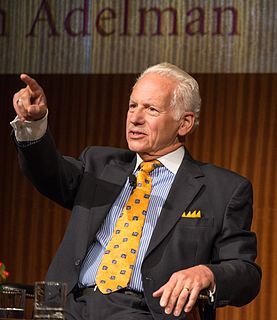
Sheldon Rampton is an American editor and author. He was editor of PR Watch, and is the author of several books that criticize the public relations industry and what he sees as other forms of corporate and government propaganda.

The phrase "axis of evil" was first used by U.S. President George W. Bush in his State of the Union address on January 29, 2002, less than five months after the 9/11 attacks, and often repeated throughout his presidency, to describe foreign governments that, during his administration, allegedly sponsored terrorism and sought weapons of mass destruction. The notion of such an axis was used to pinpoint these common enemies of the United States and to rally the American populace in support of the War on Terror. The countries originally covered by the term were Iran, Ba'athist Iraq, and North Korea. In response, Iran formed a political alliance that it called the "Axis of Resistance" comprising Iran, Syria and Hezbollah. Other countries were later added to the "axis of evil" by US politicians and commentators. The term “axis of evil” is itself a portmanteau of the Axis powers of WWII and the Cold War era “Evil Empire”.

A weapon of mass destruction (WMD) is a nuclear, radiological, chemical, biological, or any other weapon that can kill and bring significant harm to numerous individuals or cause great damage to artificial structures, natural structures, or the biosphere. The scope and usage of the term has evolved and been disputed, often signifying more politically than technically. Originally coined in reference to aerial bombing with chemical explosives during World War II, it has later come to refer to large-scale weaponry of warfare-related technologies, such as chemical, biological, radiological, or nuclear warfare.

The Iraq disarmament crisis was claimed as one of primary issues that led to the multinational invasion of Iraq on 20 March 2003. Since the 1980s, Iraq was widely assumed to have been producing and extensively running the programs of biological, chemical and nuclear weapons. Iraq made extensive use of chemical weapons during the Iran–Iraq War in the 1980s, including against its own Kurdish population. France and the Soviet Union assisted Iraq in the development of its nuclear program, but its primary facility was destroyed by Israel in 1981 in a surprise air strike.

Edward Louis Bernays was an American theorist, considered as pioneer in the field of public relations and propaganda, referred to in his obituary as "the father of public relations". Bernays was named one of the 100 most influential Americans of the 20th century by Life. He was the subject of a full-length biography by Larry Tye called The Father of Spin (1999) and later an award-winning 2002 documentary for the BBC by Adam Curtis called The Century of the Self.

William Kristol is an American neoconservative writer. A frequent commentator on several networks including CNN, he was the founder and editor-at-large of the political magazine The Weekly Standard. Kristol is now editor-at-large of The Bulwark.

The Nayirah testimony was false testimony given before the United States Congressional Human Rights Caucus on October 10, 1990, by a 15-year-old girl who was publicly identified at the time by her first name, Nayirah. The testimony was widely publicized, and was cited numerous times by United States senators and President George H. W. Bush in their rationale to support Kuwait in the Gulf War.
Weapons of Mass Deception is pejorative expression used by some people to describe U.S. President George W. Bush's claim that Saddam Hussein possessed weapons of mass destruction as justification for the war on Iraq.

William Scott Ritter Jr. is a former Marine Corps intelligence officer who served with the United Nations implementing arms control treaties, with General Norman Schwarzkopf in the Persian Gulf during Operation Desert Storm, and in Iraq, overseeing the disarmament of weapons of mass destruction (WMD), as a United Nations weapons inspector, from 1991 to 1998. He later became a critic of United States foreign policy in the Middle East.
Citizens for a Free Kuwait (CFK) was an astroturf operation established by the Kuwaiti government to persuade the American public to look favourably on US military action in the Persian Gulf. Its principal payment was to public relations firm Hill & Knowlton, who were associated with the false testimony to the US Congress given by Nayirah al-Ṣabaḥ.
Kenneth R. Timmerman is a political writer and conservative activist who was the 2012 Republican nominee for U.S. Representative for the newly redrawn Maryland's 8th congressional district, facing the incumbent Chris Van Hollen, a Democrat. Timmerman lost to Van Hollen, 33% to 63%. In 2000, Timmerman was a candidate for the Republican nomination for U.S. Senator from Maryland. Timmerman is executive director of the Foundation for Democracy in Iran, an organization that works to support democratic movements in Iran. He authored Shakedown: Exposing the Real Jesse Jackson. Timmerman has also written on the spread of weapons of mass destruction in the Middle East. He is currently an Expert at Wikistrat. He ran for Lieutenant Governor of Maryland on a ticket with businessman Charles Lollar in the 2014 Maryland gubernatorial election. The Lollar/Timmerman ticket finished third in the Republican primary.

Kenneth Lee Adelman is an American diplomat, political writer, policy analyst and William Shakespeare scholar. Adelman has been a member of the board of directors of the global data collection company RIWI Corp. since June 2016.

The rationale for the Iraq War, both the 2003 invasion of Iraq and the subsequent hostilities, was controversial because the George W. Bush administration began actively pressing for military intervention in Iraq in late 2001. The primary rationalization for the Iraq War was articulated by a joint resolution of the United States Congress known as the Iraq Resolution.

A Pretext for War: 9/11, Iraq, and the Abuse of America's Intelligence Agencies is a 2004 book by journalist James Bamford that takes a highly critical view of the events around 9/11 and the subsequent Iraq War.
Most textbooks date the establishment of the "Publicity Bureau" in 1900 as the start of the modern public relations (PR) profession. Of course, there were many early forms of public influence and communications management in history. Basil Clarke is considered the founder of the public relations profession in Britain with his establishment of Editorial Services in 1924. Academic Noel Turnball points out that systematic PR was employed in Britain first by religious evangelicals and Victorian reformers, especially opponents of slavery. In each case the early promoters focused on their particular movement and were not for hire more generally.

Bovine spongiform encephalopathy (BSE), commonly known as mad cow disease, is an incurable and invariably fatal neurodegenerative disease of cattle. Symptoms include abnormal behavior, trouble walking, and weight loss. Later in the course of the disease the cow becomes unable to function normally. The time between infection and onset of symptoms is generally four to five years. Time from onset of symptoms to death is generally weeks to months. Spread to humans is believed to result in variant Creutzfeldt–Jakob disease (vCJD). As of 2018, a total of 231 cases of vCJD had been reported globally.

The lead-up to the Iraq War began with United Nations Security Council Resolution 687 and subsequent UN weapons inspectors inside Iraq. This period also saw low-level hostilities between Iraq and the United States-led coalition from 1991–2003.

Propaganda is information that is not impartial and used primarily to influence an audience and further an agenda, often by presenting facts selectively to encourage a particular synthesis, or using loaded messages to produce an emotional rather than a rational response to the information presented. The term propaganda has acquired a strongly negative connotation by association with its most manipulative and jingoistic examples.
Since the end of the 20th century, propaganda has evolved significantly. Today's propaganda is characterised by psych-ops and disinformation, whereas a few decades ago it was dominated by posters and simple films.

The Free Iraqi Forces (FIF) were a militia made up of Iraqi expatriates, who served in the 2003 invasion of Iraq and its aftermath, under the control of Ahmed Chalabi's Iraqi National Congress government-in-exile. The specifically paramilitary branch of the program was also known as the Free Iraqi Fighting Forces (FIFF), while other elements served as interpreters or on civil affairs projects.













